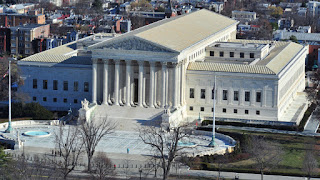 |
| U.S. Supreme Court Building |
The justices sent the case involving transgender high school student Gavin Grimm back to the same U.S. appeals court that last year ruled in Grimm's favor, with the dispute centering on a federal anti-discrimination law, a constitutional issue and the Trump administration's Feb. 22 action.
The move was the latest legal fallout from Trump's extensive use of executive power in the opening weeks of his presidency and was at least a temporary setback for transgender rights.
The action came after Trump's administration retracted a directive by former President Barack Obama's administration telling public schools nationwide to let transgender students use bathrooms matching their gender identity.
Grimm, 17, was born a girl and identifies as male. Grimm, due to graduate from high school in June, sued the Gloucester County School Board to win the right to use the public school's boys' bathroom. Grimm argued the school's refusal violated a federal anti-discrimination law called Title IX of the Education Amendments of 1972 and the U.S. Constitution's guarantee of equal protection under the law.
The justices sidestepped what would have been the Supreme Court's first ruling on the issue of transgender rights and canceled arguments that had been scheduled for March 28.
"Obviously this is not what we wanted, and it's disappointing it's going to drag this conversation out even longer," Grimm said.
But, Grimm added, "If it took 10 years I would stick with it."
The Richmond, Virginia-based 4th U.S. Circuit Court of Appeals in April 2016 sided with Grimm based on the Obama administration's interpretation of the anti-discrimination law. It now gets a second chance to rule on the dispute, with its earlier decision - the first of its kind by a federal appeals court - wiped off the books.
Obama's May 2016 guidance said that transgender students were protected under Title IX, which bars sex discrimination in education. The Trump administration's move left the bathroom access decision to the states. Both sides in the dispute had asked the justices to decide the case despite Trump's rollback.
Title IX applies to federally funded schools. The question of whether it covers transgender students remains unresolved and is likely to reach the high court at some time.
'PRIVACY, SAFETY AND DIGNITY'
Kerri Kupec, a lawyer with conservative Christian legal group Alliance Defending Freedom, which backed the school board, said the move by the justices was expected in light of Trump's action.
"The 4th Circuit should affirm the plain meaning of Title IX, which protects boys' and girls' privacy in locker rooms, showers and restrooms. School officials should be free to protect their students' privacy, safety and dignity without federal government interference," Kupec said.
The school board said in a statement it "looks forward to explaining why its commonsense restroom and locker room policy is legal under the Constitution and federal law" when the case is taken up again by the 4th Circuit. The school board policy requires students to use the bathroom that corresponds with their gender at birth.
The issue of allowing transgender people to use public bathrooms that correspond to their gender identity rather than their birth gender has become the latest flashpoint in the long U.S. battle over lesbian, gay, bisexual and transgender rights.
"This is a detour, not the end of the road, and we'll continue to fight for Gavin and other transgender people to ensure that they are treated with the dignity and respect they deserve," said Joshua Block, an American Civil Liberties Union lawyer who represents Grimm.
The matter heated up after North Carolina passed a Republican-backed law last year requiring people to use bathrooms matching their gender at birth in government buildings and public schools. The North Carolina law also blocked local measures protecting lesbian, gay, bisexual and transgender people from discrimination.
The Obama administration's nationwide guidance told public schools that transgender students should be allowed to use the bathroom of their choice, and indicated that states could lose education funding if they did not comply.
That action infuriated many conservatives and prompted a Republican-led legal effort to fight it.
The Supreme Court in July 2016 voted 5-3 to temporarily block the appeals court decision from going into effect, a move that prevented Grimm from using the boys' bathroom when the new school year began in September.




0 Comments